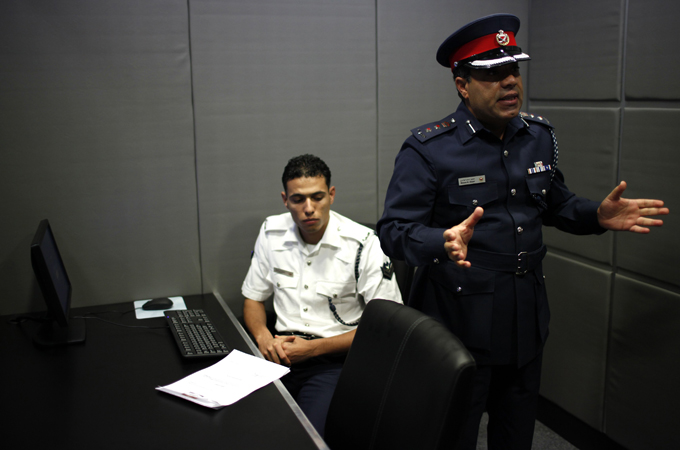Bahrain praises ‘progress’ toward reforms
King Hamad says commission’s report on tackling police abuse and politicised sackings is an “impressive beginning”.

 |
| The government says it has begun planning an independent “ombudsman’s office” to oversee the police [Reuters] |
Bahrain has claimed “significant and broad progress” toward reforms in a report following up earlier recommendations to correct widespread abuse committed during the government’s crackdown on pro-democracy protests last year.
The report, submitted by the country’s National Commission to King Hamad bin Isa al-Khalifa on Tuesday, is meant to gauge what progress the government has made since November, when an independent investigation concluded that security forces had killed unarmed protesters and tortured and abused prisoners during the crackdown.
The Bahrain Independent Commission of Iniquiry (BICI), led by human rights lawyer Cherif Bassiouny, recommended in November that the government investigate and punish instances of torture, end arbitrary detention, and review cases that had been tried in military courts.
The National Commission claimed in its report that progress had been made, citing the creation of a new police code of conduct and an independent office to oversee and prosecute the police. The report also said the government had begun to rebuild Shia places of worship and reinstate Shia workers who were fired during the unrest.
King Hamad welcomed the National Commission’s evaluation, saying it represented “significant and broad progress” and an “impressive beginning”.
Reforms have included “security and judicial reform, enhancing educational curricula, establishing a detailed plan to reform the media, [and] working tirelessly to ensure that employees are reinstated,” the king said.
Al Jazeera’s Mohamed Vall, reporting from Manama, said King Hamad “gave a very clear, strong statement about the improvements that have been taking place”.
The government has conducted police trainings, released prisoners, improved prison environments and set up a fund to compensate torture victims, Vall said.
‘Significant progress’
Al Wefaq, the country’s largest Shia opposition bloc, has pointedly refused to take part in the National Commission’s work, and the body is made up mostly of pro-government figures. Ali Saleh al-Saleh, the commision’s chairman, is the head of the upper house of parliament, which is appointed by the king.
Saleh said he “received utmost co-operation and transparency from the government” and singled out long-serving Prime Minister Khalifa ibn Salman Al Khalifa, viewed by the opposition as the symbol of the monarchy’s corruption and anti-Shia policies, for praise.
The government says it has fulfilled most of the requirements, and a new website touts its progress.
“I would say about 90 per cent of the recommendations have been implemented. It’s been hard. We’ve had to swallow a lot of pride,” said Abdelaziz bin Mubarak al-Khalifa, an official from Bahrain’s information affairs authority.
Bahrain’s main opposition groups, however, said little progress and no efforts at dialogue had been made. Many in the opposition have said they would only negotiate with the government after all political prisoners are released.
“Torture is still going on in Bahrain,” said Ali al-Aswad, a former member of parliament. “So whatever [the government] says, it is something only written on the websites or in the paper.”
Abdul Jalil Khalil, the head of Al Wefaq, told Al Jazeera he was not happy with the reforms and that even “full implementation” of BICI’s recommendations might not be enough to satisfy them.
“BICI deals with violations and human rights abuses committed by the Bahraini security forces in cracking down on protests. But, what the opposition really wants is more serious political change that will give them more say in parliament and government,” he said.
Inspired by uprisings in Tunisia and Egypt, the kingdom’s predominantly Shia population took to the streets in February 2011, demanding greater freedoms in the Sunni-led kingdom and an end to widely perceived corruption.
The authorities responded by launching a crackdown, described by many as brutal and excessive, killing more than 30 unarmed protesters and arresting and injuring many more.
In the face of a global outcry, King Hamad set up an independent commission of inquiry to probe allegations of excesses. The report confirmed cases of torture and illegal detentions and embarrassed the country’s ruling Sunni elite.